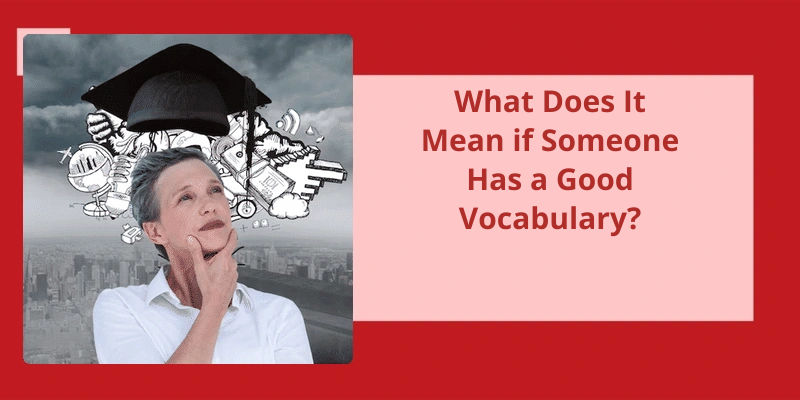A person's vocabulary can be a strong indicator of their communication skills and level of intelligence. Having a good vocabulary means possessing a wide range of words and language skills that allow for clear and concise expression of ideas. It’s often associated with being eloquent, well-versed, erudite, and articulate. On the other hand, those with a poor vocabulary might struggle to express themselves well and may be considered linguistically challenged or inarticulate. Good vocabulary isn’t only useful in professional settings, but it also plays a vital role in personal relationships and societal and cultural contexts.
Is Vocabulary Related to IQ?
Vocabulary is often regarded as one of the essential aspects of language proficiency and helps assess ones verbal ability and aptitude. However, when it comes to measuring ones intelligence quotient (IQ), the relationship between vocabulary and IQ is a bit more complicated. Research has shown that there’s a correlation between vocabulary size and intelligence, but this relationship isn’t always straightforward.
Studies indicate that people with a larger vocabulary tend to have better verbal abilities and higher IQ scores. Several factors, such as fluency in a non-native language or unique educational backgrounds, can affect how well one is able to express themselves verbally.
Moreover, bilingual or non-native speakers may encounter difficulty in fully expressing themselves due to a limited vocabulary. While their intelligence level may be just as high as a native speaker, their verbal ability in the language may not be on par with that of a monolingual native speaker. These limitations can skew results and lead to inaccurate perception of ones intelligence based solely on vocabulary.
The Impact of Socioeconomic Status on Vocabulary Development and Intelligence
This article discusses the correlation between socioeconomic status and vocabulary development and intelligence. It aims to provide insights into how a person’s economic status may affect their overall cognitive abilities, and to encourage societal efforts in making education accessible to everyone regardless of their background.
In addition, a big vocabulary will also enable you to comprehend and analyze complex texts and conversations, as well as to enhance your critical thinking skills. Let’s explore the various benefits of having a vast vocabulary and how you can improve your vocabulary.
What Does Having a Big Vocabulary Mean?
In addition to facilitating personal expression, a large vocabulary can also contribute to professional success in a range of fields. For example, those who work in journalism, marketing, public relations, or law, require a strong command of language to communicate effectively with a diverse audience. In fact, many companies use vocabulary tests as part of their recruitment process to identify candidates with strong language skills.
Moreover, having a large vocabulary can improve your memory and mental agility. Studies have shown that regularly learning and using new words can sharpen the brains neural pathways, which in turn, can improve cognitive function and prevent age-related mental decline. As such, regular practice can contribute to better overall mental health and wellbeing.
Beyond the practical benefits, having a strong vocabulary can also be a source of personal satisfaction and enrichment. By being able to think and communicate more precisely, you may be able to deepen your understanding of the world around you, and open yourself up to new ideas and experiences. Indeed, reading and learning new words can be a pleasurable and rewarding experience, allowing you to appreciate languages beauty and complexity.
Similarly, having a rich vocabulary can impact your social life and relationships. In social situations, being able to choose the right word can mean the difference between coming across as confident and articulate or appearing unsure and awkward. Furthermore, being able to understand and use different words can make it easier to connect with others, as you can better appreciate their views and perspectives.
Source: What’s it like to have a large vocabulary (know a lot …
As our language skills develop, our vocabulary grows along with it. A robust vocabulary helps us to better express ourselves and communicate effectively with others. But what exactly do we call this collection of words that we know and use? The answer lies in the concept of a lexicon, which encompasses not only an individual’s personal vocabulary but also the entire set of words within a given language.
What Do You Call a Person’s Vocabulary?
It encompasses not only the words themselves, but also the nuances and connotations that come with their usage. A persons vocabulary can give insights into their educational background, general knowledge, and even their personality traits.
Expanding ones vocabulary can be a valuable tool in both personal and professional settings. For instance, having a more extensive vocabulary allows one to communicate more effectively and persuasively. Additionally, being able to understand and use a wider range of words can contribute to ones critical thinking and analytical abilities.
There are many ways to enhance ones vocabulary, including reading widely, practicing with flashcards or word lists, and engaging in conversations with others who’ve varied vocabularies. It’s important to note that while having a large vocabulary can be impressive, it’s equally important to use words appropriately and in context.
Some studies have suggested a correlation between a persons vocabulary size and their intelligence, though this isn’t always the case. It’s possible for someone with a smaller vocabulary to still be highly intelligent and successful. However, it’s undeniable that having a broad vocabulary can improve ones communication skills and overall intellectual prowess.
Continually learning and expanding ones lexicon is a worthwhile pursuit for anyone looking to improve their communication skills, critical thinking, and overall cognitive abilities.
The Benefits of a Strong Vocabulary in Different Fields, Such as Academia, Business, and Creative Writing.
- Improved academic performance
- Greater communication skills in the workplace
- Increased creativity in writing
- Better ability to comprehend complex texts
- Greater confidence in public speaking
- Enhanced critical thinking and problem-solving abilities
- Improved memory retention and cognitive function
- Increased cultural understanding and empathy
While there’s been much debate around whether increasing vocabulary directly correlates with an increase in IQ, research has shown that there’s a high correlation between vocabulary and verbal intelligence, which is one important component of overall intelligence. In fact, a larger vocabulary has been found to be strongly associated with higher scores on IQ tests. So, let’s explore more about this topic.
Does Increasing Vocabulary Increase IQ?
There are many factors that can impact an individuals intelligence levels including genetics, environment, and upbringing. However, one area that’s been extensively studied is the relationship between vocabulary and IQ. It’s long been believed that increasing ones vocabulary can lead to an increase in intelligence and cognitive abilities.
However, it’s important to note that simply learning new words doesn’t guarantee an increase in intelligence. For example, critical thinking, problem-solving, and spatial reasoning are all important aspects of intelligence that must also be cultivated.
Another important consideration is that the quality of ones vocabulary is just as important as the quantity. Instead, individuals must focus on acquiring a deep understanding of words and their usage in order to truly improve their cognitive abilities.
It’s also important to focus on developing other areas of intelligence and cultivating a deep understanding of the words one is learning in order to truly reap the benefits.
The Impact of Bi-Lingualism on Intelligence
Research suggests that being bilingual has a positive impact on cognitive abilities and can enhance certain aspects of intelligence, such as problem-solving and creative thinking skills. It’s believed that switching between languages strengthens the brain’s cognitive flexibility and allows for better communication and problem-solving abilities.
Having a solid and diverse vocabulary is essential for strong communication skills, and it plays a significant role in a child’s academic success. Research has shown that children with a larger vocabulary have a better chance of performing well in school, especially when it comes to reading and writing. In this article, we explore why it’s important to build a rich vocabulary and provide some tips on how to do so.
Why Is It Important to Have a Rich Vocabulary?
In fact, many studies have shown that children with larger vocabularies have higher reading comprehension scores, which is particularly important as children move through the upper grades and into higher education. This correlation exists because the more words a child knows, the easier it’s for them to understand written material and communicate effectively.
A rich vocabulary can also have an impact on a childs social development. Children with strong vocabularies tend to be confident in their communication skills and are better equipped to express themselves accurately and persuasively. This not only helps them in academic settings but also in social situations, as they’re more likely to be perceived as articulate and intelligent. This can lead to increased self-esteem and social standing.
Furthermore, having a robust vocabulary can be valuable in the workplace. Effective communication is essential in many industries, and individuals with a broader range of vocabulary are often perceived as more competent and professional. They’re able to express themselves more clearly and succinctly, which can lead to increased efficiency and productivity.
Additionally, a rich vocabulary allows individuals to appreciate and understand a wider range of literature and media. They’re able to comprehend and engage with more advanced texts, which can enhance their critical thinking skills and broaden their cultural understanding. This ability can also lead to a greater appreciation for language and it’s nuances, which can be beneficial in personal and professional relationships.
How to Enhance Your Vocabulary Through Reading, Writing, and Conversation
Improving your vocabulary is possible through reading, writing, and conversation. By reading different materials, you encounter new and unfamiliar words that add to your vocabulary. Writing is also helpful in learning new words as you research and use them to express your thoughts more effectively. Conversation with others allows you to practice using new words in context, and get feedback on your pronunciation and usage.
Conclusion
It reflects one's level of education, exposure, and critical thinking abilities. It enhances one's ability to make logical deductions, understand complex concepts, and express themselves clearly. In contrast, a limited vocabulary can impede a person's success both personally and professionally, limiting their ability to articulate their thoughts and ideas. It’s clear that a strong vocabulary is an essential component of effective communication and should be a lifelong pursuit for all individuals.






